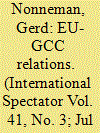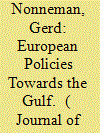|
|
|
Sort Order |
|
|
|
Items / Page
|
|
|
|
|
|
|
| Srl | Item |
| 1 |
ID:
064951


|
|
|
|
|
| Publication |
London, Routledge, 2005.
|
| Description |
v, 269p.
|
| Standard Number |
0714684279
|
|
|
|
|
|
|
|
|
|
|
|
Copies: C:1/I:0,R:0,Q:0
Circulation
| Accession# | Call# | Current Location | Status | Policy | Location |
| 049924 | 327.5604/NON 049924 | Main | On Shelf | General | |
|
|
|
|
| 2 |
ID:
054435


|
|
|
| 3 |
ID:
074577


|
|
|
|
|
| Publication |
2006.
|
| Summary/Abstract |
The emergence of a bloc-to-bloc EU-GCC relationship is constrained by the divergent economic and political interests and foreign policy roles of the member states on both sides; the structural limitations of both organisations; the absence of a "champion" within the EU for collective relations with the GCC; the nature of the Gulf leaders' diplomacy; and the role of the US. From the GCC side, relations with Europe are shaped by a view of the latter as a key market and source of imports, and a means of diversifying the GCC states' economic and security resources. From the European side, the relationship has been moulded by the EU-wide interest in a stable Gulf region both for the security of world energy supplies, and the GCC states' potential contribution to stabilising the rest of the region; pre-existing relationships with particular member states; diverse perceptions of the relationship to the US and US policy; and varying levels of bilateral economic interest. The EU's ostensible pursuit of political reform and good governance is constrained by its own limited ability to develop a common policy on the matter, and limited leverage over the GCC states.
|
|
|
|
|
|
|
|
|
|
|
|
|
|
|
|
| 4 |
ID:
178585


|
|
|
|
|
| Summary/Abstract |
This paper discusses European policies towards the Qatar crisis in the context of the evolution of broader past and present European policies towards the Gulf. It starts with a summary discussion of historical patterns of relations between Europe and the Gulf, before briefly sketching the major changes in the regional environment after the Second World War, beginning with the US supplanting the UK as the dominant hegemon, through to the changes wrought by Trump’s elevation to the US presidency. It then turns to a discussion of the effects of these changes for the Gulf and other regional states and their policy postures, before going on to examine the ways in which European states and the EU have interpreted and reacted to this changing environment. These reactions are often at one and the same time a reaction to the changes and uncertainties in US policy under Trump, since this changing US role is also a crucial ingredient both in the region and for Europe’s room for manoeuvre. Against this background, the paper will outline European policies towards the Gulf theater in particular, focusing on Iran and the JCPOA nuclear deal, and the GCC (or Qatar) crisis –– while also briefly considering the Yemen crisis and the impact of Gulf competition on and in the Libyan theater. From October 2018, the Khashoggi affair added an additional dimension to the crisis, as did the renewed oil price crash amidst the global COVID-19 pandemic beginning in 2020.
|
|
|
|
|
|
|
|
|
|
|
|
|
|
|
|
| 5 |
ID:
177201


|
|
|
|
|
| Summary/Abstract |
On the occasion of the 10th anniversary of the Journal of Arabian Studies (JAS), this article offers the first history of the field of Gulf and Arabian Peninsula Studies (GAPS), including the origins and evolution of JAS. It begins with an overview of the origins and evolution of GAPS as a field of scholarship, then provides a detailed survey of the field’s institutional development, which can be traced back to the region’s post-war oil wealth and the large oil-funded archaeological expeditions of the 1950s–60s. This is reflected in GAPS’s first societies, centres, and journals, which catered exclusively to archaeologists, historians, and Arabists. The transformation of GAPS into a global interdisciplinary field (encompassing both humanities and social sciences) began in 1969, although it remained a fringe field within Middle East Studies. The expansion of GAPS into a mainstream field in its own right began in the 2000s, reaching critical mass in the 2010s, resulting in the establishment of the Association for Gulf and Arabian Peninsula Studies (AGAPS) and the launch of JAS. In the past decade, GAPS also expanded beyond Middle East Studies to embrace Indian Ocean Studies. The article concludes with an overview of JAS’s first decade: 2011–20.
|
|
|
|
|
|
|
|
|
|
|
|
|
|
|
|
| 6 |
ID:
054437


|
|
|
|
|
|
|
|